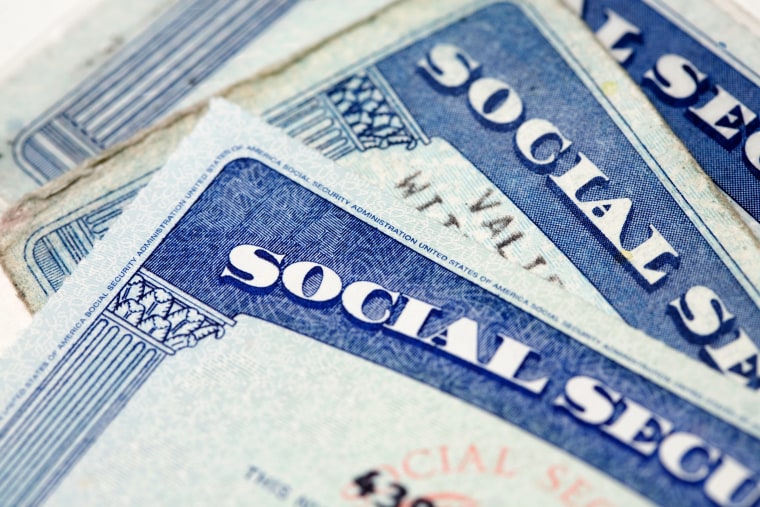Social Security may be America's favorite octogenarian.
Two-thirds of Americans view Social Security, which turned 80 years old Friday, as one of the most important government programs, according to a new AARP survey. That view has remained consistent in AARP polling since 1995. And 82 percent of Americans said it is important to contribute to Social Security for the common good.
Most retirees depend on Social Security for part of their income. Overall, Social Security retirement benefits represent about 38 percent of the income for seniors, but more than half of married couples claiming benefits and nearly three out of four unmarried retirees depend on the program for 50 percent or more of their income, according to the Social Security Administration.
The agency sent checks to more than 39.6 million retired workers in June with an average monthly benefit of $1,335. Last year, more than 59 million Americans received $863 billion in Social Security benefits, which includes disability benefits.
But Americans have doubts that Social Security will be there for them when they retire. Only 43 percent express confidence in the future of Social Security, according to AARP.
They have good reason to worry. The trust fund for Social Security retirement benefits is expected to be depleted by 2034. After that, the program is projected to pay out about 75 percent of benefits. (AARP found that 73 percent of people do not know that Social Security will be able to pay benefits at a reduced level when the program's trust fund is depleted.)
"We have a retirement income crisis that is not here today, but Generation X and millennials will face it."
Baby boomers, an estimated 10,000 of whom retire every day, are the cause of Social Security's rapidly shrinking trust fund. By 2033, the number of Americans eligible for retirement benefits will increase to more than 77 million from 46.6 million today. Meanwhile the ratio of workers paying into Social Security to the program's beneficiaries is projected to fall from 2.8 now to 2.1 in 2033.
"We have a retirement income crisis that is not here today, but Generation X and millennials will face it," said Ben Veghte, vice president of policy at the nonpartisan National Academy of Social Insurance.
Last year, Social Security benefits amounted to about 5 percent of U.S. GDP. By 2035, when the youngest baby boomers will have turned age 70, Social Security benefits under current law are projected to be 6.2 percent of GDP, according to projections by the academy.
Should You Ever File for Social Security Early?
That's an increase of 1.2 percentage points over the current cost of Social Security, which is considerably less than the increase in spending for public education that occurred when baby boomers entered the school system, Veghte noted. "Social Security's shortfall is not that dramatic," he said.
To close Social Security's funding gap, lawmakers will have to reduce benefits, raise revenue for the program or a combination of both.
"Fixing Social Security is not a matter of funding. It's a matter of values," said Nancy Altman, co-founder of Social Security Works, which advocates increasing the program's benefits. Altman noted that the U.S. ranks toward the bottom, internationally, in terms of retirement benefits, according to the Organization for Economic Cooperation and Development.
Seven in 10 Americans would prefer a package of changes to Social Security that increases revenue, pays for improved benefits and eliminates the projected financing gap to the status quo, according to a survey of more than 2,000 people aged 21 years and older conducted by the National Academy of Social Insurance last year.
How to Land Another $50,000 in Benefits
The preferred package of changes included eliminating the cap on earnings that are taxed for Social Security over the next 10 years (the cap is $118,500 in 2015); raising payroll taxes that fund Social Security from 6.2 percent of earnings to 7.2 percent over 20 years; increasing the cost-of-living adjustment by basing it on inflation experienced by seniors; and raising Social Security's minimum benefit so that a worker who pays into Social Security for 30 years could retire at 62 or later and have benefits above the federal poverty line.
These changes would be enough to close the funding gap and add a margin of safety, according to National Academy of Social Insurance projections.
Sixty-one percent of the 1,200 people recently surveyed by AARP agreed that it would be better to pay more into Social Security now to protect benefits for future generations.
Politics are a hurdle to making changes to Social Security, and a political fight over the program in Congress may be brewing next year. The trust fund for Social Security's disability benefits is projected to be exhausted by late 2016. After that, the Social Security Administration estimates it will only be able to pay out about 80 percent of benefits to disabled people.
The Biggest Social Security Mistake Women Make
The Obama administration has proposed shifting payroll taxes between Social Security's retirement and disability trust funds, but congressional Republicans want significant changes made to Social Security before moving the funds. Previous Democratic and Republican administrations have transferred payroll tax revenue 11 times to fix shortfalls between the two trust funds. The last time such a tactic was used was in 1994 by the Clinton administration. "It's a false crisis," Altman said.
Presidential candidates of both parties are weighing in on how to improve Social Security too. New Jersey Gov. Chris Christie, a Republican, supports gradually raising the retirement age and reducing Social Security benefits for wealthier people. Meanwhile, Hillary Clinton, the Democratic front-runner, hinted she would be open to the idea of raising the earnings cap on Social Security taxes.
Whatever happens, any reforms to Social Security will be a long time coming. The last major changes were made in 1983. It took a bipartisan commission led by Alan Greenspan, a year of negotiations by lawmakers and 22 years to phase in a modest increase in the full retirement age.
